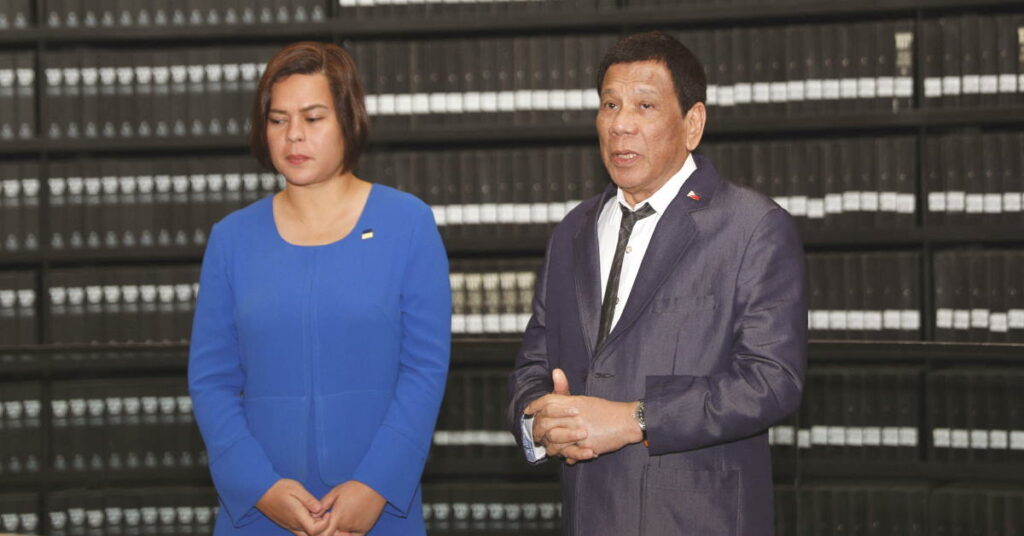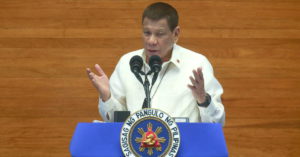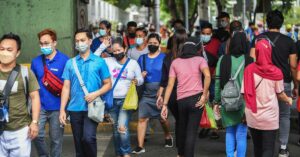
Philippine politics has been predominantly characterised as an “elite democracy” dominated by elite political parties, personalities, and political clans who are not only “gurus” of political “clientelism,” but are more often than not co-opted and under the tutelage of oligarchs, in which power brokers deliver votes to politicians in exchange for the granting of favours and “special privileges.”
Philippine politics is also very much dictated by personality-based politics and is largely dominated by traditional politicians or “trapos” who in many ways treat and regard Philippine politics most often than not as their personal affairs and playhouse rather than that of the Filipino people.
Many of these politicians claim to have an understanding of the plight of ordinary Filipinos, but in reality have no deep grasp or appreciation of the quandaries, predicaments and plight of the ordinary Filipino.
To note, the word “trapos” is derived from the words “traditional politicians, which means “rags in Filipino. “Trapos” are politicians who will say and do anything – including dirty tricks and publicity –and will spew black propaganda and throw mud against other politicians, just to get elected or what they want for their personal and political interests.
Political Circus And The Clowns
In retrospect, as the 2022 national election is fast approaching, Filipino politicians most particularly those epitomising the “trapo” brand of politics are ready to take centre stage in the political circus of the country, complete with intrigue, suspense, scandals, black propaganda and all sorts of mud-slinging between each other.
Indeed, the political circus has begun in the country and the political stage is now open for clowning and jesting, luring, beguiling, and charming voters to vote for them as they showcase their brand of politics.
One of the most interesting political characters in the Philippine political circus nowadays is Senator Manny Pacquiao who most probably will run for the office of the presidency this coming 2022 elections.
Pacquiao is no doubt celebrated by Filipinos as one of the greatest professional boxers of all time. But his latest bout as a politician against the incumbent president has impacted his political life negatively as evidenced by the fact that his approval and trust ratings have gone down after exchanging tirades with President Duterte.
To add, Pacquaio was ousted on 17 July, 2021 as president of his political party, which further dampens his bid to win the party endorsement for his possible presidential candidacy in the 2022 elections.
The boxing legend is also facing antagonistic party mates and allies, which may propel him to probably move from one party to another soon.
No doubt, Pacquaio as a boxer has all the acumen for sports, but as a politician, he lacks the political acumen and sharpness to even recognise that a political feud against his long-time friend now turned-political nemesis is political suicide.
Another political character that has gained the ire of President Duterte lately, is presidential wannabe and new president of the Aksyon Demokratiko Party, the mayor of Manila, Isko Moreno Domagoso also known as “Yorme”.
Just like most Filipino politicians, Yorme is a “political butterfly.” After transferring from the National Unity Party (NUP), he was suddenly elected as president of his new political party. However, veteran journalist Jay Sonza who is very popular among Filipino netizens raised questions on the election of Yorme as president.
“Wow Isko! Paano nangyare (how it happens) that a political butterfly like you is now the president of the principled political party? AKSYON DEMOKRATIKO IS NOT YOUR PARTY MAYOR,” Sonza argued.
Sonza also contended that the party’s council of leaders were unaware of Isko’s election and were shocked by the news that Yorme had been elected as party president. With Sonza’s contention, it seems that Yorme has a lot of explaining to do in this regard.
Continuity Or Distraction
On the other hand, Vice-President Leni Robredo, another fascinating political personality who belongs to the political opposition has also joined the fray. She recently said, “We can’t last another six years of this kind of governance.”
Robredo, who is likely to run for the presidency in the upcoming 2022 elections seems apprehensive and bothered amid the increasing clamour from the Filipino people for the president’s daughter, the incumbent Mayor of Davao City, Sara Duterte-Carpio, and for President Duterte to run for the country’s two highest posts in 2022.
It can be noted that President Duterte has emerged from a recent poll as top choice for vice president, while his daughter, Mayor Sara, remains the most popular pick to be his successor as president in all political surveys conducted recently.
To add, the mayor from Davao city has already gained the backing of at least five political parties via a powerful coalition she heads and has a lot of organised grassroots supporters and volunteers across the country.
It seems that the political opposition until now is ignorant or has not come to terms with the fact that the very impetus that brought Duterte to the seat of power was the failure of the previous administration to recognise and respond to the plight of ordinary Filipinos.
Lest the political opposition forget that the heightened public dissatisfaction with the “business-as-usual” practices of the Aquino administration, had led to Filipinos electing the “blunt-tough-talking” strongman and leader in 2016.
President Duterte who promised a strong, top willed governance has been perceived by the Filipino people as the leader the country needs who not only possesses the critical leadership attributes that were deficient among previous presidents but who can act on the longstanding political challenges facing the country such as corruption, high inequality, poverty, business cartels in many sectors, violent crime, peace and order, the drug menace, the continuing banditry and insurgency in the south, and countering the terrorist activities of the CPP-NPA (Communist Party of the Philippines-New Peoples’ Army).
The likes of Robredo seem to forget that Duterte’s victory in 2016 was a phenomenon that is somehow perceived as not only the “revolt of the poor” but the “protest of the middle class” against the previous administration. Furthermore, the majority of Filipinos are clamouring for continuity and not the other way around.
Filipinos want to build on the achievements of the anti-illegal drug campaign of the Duterte administration which include: (a) 3,736 children rescued during anti-drug operations from July 2016- May 2021; (b) convinced 1,223,195 people involved in drugs to surrender as of June 2021; (c) 22,093 drug cleared barangays from July 2016 to May 2021; (d) PHP 59.93 billion (US$1.18 billion) worth of seized illegal drugs from July 2016 to May 2021; (e) 203,715 anti-illegal drug operations from July 2016 to July 2021; and 807 dismantled drug dens.
Filipinos want continuity, which in many ways is connected to the relative successes of the anti-illegal drug campaign, that was able to arrest 12,356 high-value targets and achieved a 64 percent lower crime volume from July 2016 to June 2021.
Filipinos also want the “Build Build Build” program of the Duterte administration pursued by the next administration. The infrastructure program was able to complete 5,950 bridges to date, and was able to construct 29,264 kilometres of roads as of June 2021.
In terms of education, Filipinos want the next administration to pursue free tuition in public schools, in-state colleges, and universities. This was put in place by the Duterte administration, which benefited around 1,623,628 students.
In the area of poverty alleviation, Filipinos want the next administration to build on poverty alleviation efforts of the Duterte administration, which lifted around six million Filipinos before the pandemic hit the country.
Likewise, Filipinos would like the next administration to continue to pursue the implementation of Universal Health Care that benefited around 109,035,343 Filipinos from June 2019 to June 2021.
Whereas in the area of fighting local insurgency and the terroristic acts of the CPP-NPA, Filipinos want a leader who will seriously build on the successes of the current administration and continue the fight against the CPP-NPA until peace and development in the countryside are achieved.
Conclusion
In retrospect, choosing the next president of the Philippines and a new set of elected officials and leaders in the upcoming 2022 elections is a crucial task Filipinos must seriously ponder on. Whoever becomes the next president, vice-president, senators, congressmen/women, governors, mayors, etc, of the country, will have to confront the challenge of defeating the COVID-19 pandemic, a virulent and formidable enemy that has crippled the country and the world in many ways.
They will also have to confront the mounting challenges of putting back the country on a path of economic recovery alongside responding effectively and efficiently to other socio-economic and political challenges and issues that the country is faced with.
Hence, the Philippines not only needs wise, well-educated, well-rounded, able, strong-willed, compassionate leaders but also a new set of leaders who will continue the legacy and build on the successes of the current administration.
However, the process of choosing elected leaders in the Philippines is akin to a circus and many candidates are clowns. It seems also that anyone with plenty of ego, popularity, and money can run for president and other elected positions despite their lack of experience in governance and grasp of the real plight of ordinary Filipinos.
This circus politics may be entertaining, amusing, and even exciting to watch, but honestly speaking, is profoundly perilous and precarious for the country and the next generation of Filipinos.
Filipinos should rise as well to the occasion by filtering and scrutinising potential leaders before voting them into office in 2022.
In this way, Filipinos will be able to ensure that the country is in good hands after the 2022 elections given the many challenges it is confronted with.
This is Part 1 of a series of articles.
Source: The ASEAN Post
https://theaseanpost.com/article/philippine-politics-crossroads


